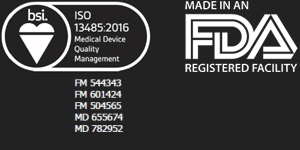MW Industries Inc., a manufacturer of precision metal components, has been playing a role in the supply chain for ventilators and other medical devices needed in the COVID-19 pandemic response. All of its locations have remained open to support the needs of its clients in every industry, including the following medical device industry support described below:
Tri-Star Industries, a manufacturer of precision threaded inserts for plastic applications, has stepped up production in its Berlin, CT, location to meet demand from the largest ventilator manufacturers in the world.
RAF Electronic Hardware, in Seymour, CT, a supplier of precision metal fasteners and components for medical equipment such as ventilators, air filtration and medical imaging systems, has been able to design, manufacture, and ship parts in a matter of days to keep production lines up and running.
Century Spring Corp. in Commerce, CA, a source of springs such as stainless-steel compression springs for both ventilator R&D and production volumes, has maintained inventories to ship same-day and supported medical OEM and contract manufacturers as they have scaled up production of ventilators.
Servometer, in Cedar Grove, NJ, manufactures several bellows used in critical ventilator applications.
Economy Spring & Stamping, in Southington, CT, used additive manufacturing to address a shortage of PPE masks at a Connecticut hospital, delivering the first batch of 3-D printed masks in under a week.
[Image courtesy of MW Industries]
MW Industries Inc.Autocam Medical
Autocam Medical, a global contract manufacturer of precision-machined surgical instruments and other device components, has been manufacturing a new ventilator splitter with individual pressure capability. The company has been collaborating with researchers at the University of Michigan to develop VentMI, moving from prototype to a part available for use in under a month, it reported in a news release.
“We’re extremely grateful to have been asked to participate in the creation of this vital new product,” said John Kennedy, CEO of Autocam Medical, in a statement. “And we’re very proud of our team’s ability to go from prototype through manufacturing, engineering, to finished product in a matter of days to help meet this crucial need for the healthcare community.”
Autocam Medical reports that the new splitter was “conceived only weeks ago” by Dr. Kyle VanKoevering of the Department of Otolaryngology-head and neck surgery at Michigan Medicine and an associate faculty member in the Department of Biomedical Engineering. VentMI overcomes a previously critical limitation for shared use of these devices. The new splitter enables individual pressure capability, whereas previous splitters could deliver only one pre-set pressure to patients.
The new splitter was designed, prototyped, tested, and received FDA Emergency Use Authorization; Autocam Medical, which was mobilized to implement Design for Manufacturing (DFM) processes, has been manufacturing the VentMI.
A new company formed by U-M inventors, MakeMedical LLC, has licensed the technology from U-M and will provide VentMI at cost to other institutions, it was reported in the release. Autocam Medical is providing its manufacturing services at cost, as well. Said Owen Tien, CEO of 3-D printing company Thingsmiths, a co-developer of VentMI and co-founder of MakeMedical: “Autocam Medical’s professionalism, speed, and quality of work is world-class. Their ability to move our components beyond 3D-printed prototypes has resulted in a product we can stand behind, and we are proud to partner with them.”
Continue reading at MD & DI…


